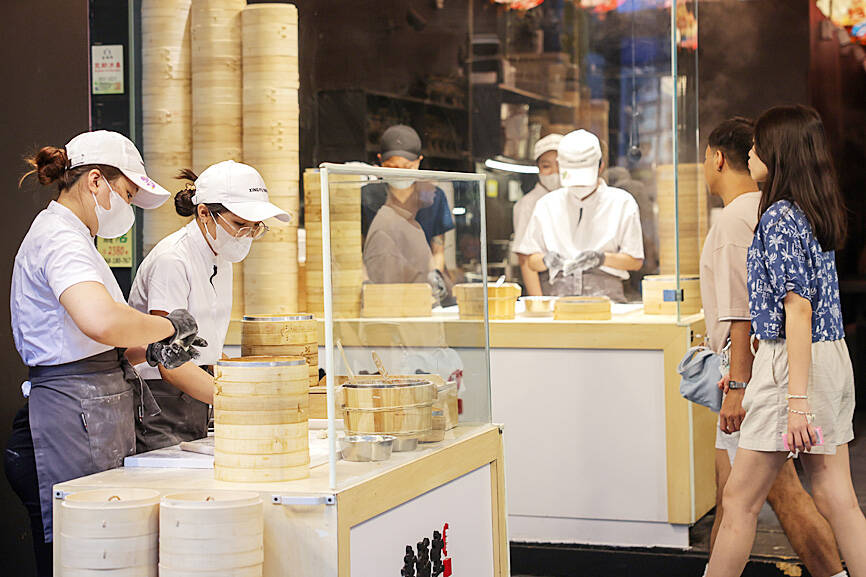The government’s business climate monitor last month turned “yellow-red,” cooling from June’s economic boom, as non-tech firms reported shipment disruptions linked to bad weather, the National Development Council (NDC) said yesterday.
The composite score decreased by 3 points to 35 last month, suggesting that Taiwan’s economy remained in a state of imbalanced recovery, it said.
“Shipments of information and communications technology products remained strong, but exports of non-tech goods took a hit from Typhoon Gaemi,” NDC Economic Department Director Chiu Chiu-ying (邱秋瑩) said.

Photo: CNA
The council uses a five-color spectrum to describe the nation’s economic state, with “red” signifying a boom, “green” indicating stable growth and “blue” suggesting sluggishness. A dual-color reading means the economy is shifting gears to a better or worse state.
Of the nine component measures, exports fell by 2 points and industrial production decreased by 1 point, the council’s latest report showed.
Heavy rainfall disrupted the production and shipments of non-tech goods, but exports of electronics were unaffected, the Ministry of Finance said earlier this month.
Dismissing concerns about the state of the economy, Chiu said the monitor would turn “red” again going forward as other indicators lent support to economic growth.
The index of leading indicators, which seeks to project the economic landscape in the coming six months, picked up by 1.13 points to 105.11, as the indices on export orders, imports of semiconductor equipment, total floor area of new housing starts, labor accession rates, money supply and other gauges all increased, Chiu said.
The leading indicators have climbed for nine months in a row, with a cumulative increase of 6.57 points, Chiu said.
Likewise, the index of coincident indicators, which reflects the current economic situation, rose by 1.04 points to 105.4, with all constituents, including exports, industrial output, average monthly overtime hours and power consumption, moved upward, Chiu said, adding that the index rose for 15 straight months.
In other news, the consumer confidence index this month increased by 2.39 points to 77.75, as Taiwanese became more optimistic about the economy, household incomes and the job market, a survey by National Central University showed yesterday.
The sub-index on consumer prices increased by 4.47 points to 42.88, as products became more expensive due to bad weather, said Dachrahn Wu (吳大任), director of the university’s Research Center for Taiwan Economic Development.
The stock and housing markets continued to boom, creating a sense of wealth inflation for households, Wu said.
However, the reading on the purchases of durable goods, noticeably real estate, dropped by 2.34 points to 109.33 after domestic banks moved to restrain their mortgage operations to avoid angering the central bank.
The monetary policymaker has voiced concern about a potential overconcentration on real-estate lending and is likely to introduce more credit controls next month after its board meeting on Sept. 19.

MULTIFACETED: A task force has analyzed possible scenarios and created responses to assist domestic industries in dealing with US tariffs, the economics minister said The Executive Yuan is tomorrow to announce countermeasures to US President Donald Trump’s planned reciprocal tariffs, although the details of the plan would not be made public until Monday next week, Minister of Economic Affairs J.W. Kuo (郭智輝) said yesterday. The Cabinet established an economic and trade task force in November last year to deal with US trade and tariff related issues, Kuo told reporters outside the legislature in Taipei. The task force has been analyzing and evaluating all kinds of scenarios to identify suitable responses and determine how best to assist domestic industries in managing the effects of Trump’s tariffs, he

TIGHT-LIPPED: UMC said it had no merger plans at the moment, after Nikkei Asia reported that the firm and GlobalFoundries were considering restarting merger talks United Microelectronics Corp (UMC, 聯電), the world’s No. 4 contract chipmaker, yesterday launched a new US$5 billion 12-inch chip factory in Singapore as part of its latest effort to diversify its manufacturing footprint amid growing geopolitical risks. The new factory, adjacent to UMC’s existing Singapore fab in the Pasir Res Wafer Fab Park, is scheduled to enter volume production next year, utilizing mature 22-nanometer and 28-nanometer process technologies, UMC said in a statement. The company plans to invest US$5 billion during the first phase of the new fab, which would have an installed capacity of 30,000 12-inch wafers per month, it said. The

Taiwan’s official purchasing managers’ index (PMI) last month rose 0.2 percentage points to 54.2, in a second consecutive month of expansion, thanks to front-loading demand intended to avoid potential US tariff hikes, the Chung-Hua Institution for Economic Research (CIER, 中華經濟研究院) said yesterday. While short-term demand appeared robust, uncertainties rose due to US President Donald Trump’s unpredictable trade policy, CIER president Lien Hsien-ming (連賢明) told a news conference in Taipei. Taiwan’s economy this year would be characterized by high-level fluctuations and the volatility would be wilder than most expect, Lien said Demand for electronics, particularly semiconductors, continues to benefit from US technology giants’ effort

‘SWASTICAR’: Tesla CEO Elon Musk’s close association with Donald Trump has prompted opponents to brand him a ‘Nazi’ and resulted in a dramatic drop in sales Demonstrators descended on Tesla Inc dealerships across the US, and in Europe and Canada on Saturday to protest company chief Elon Musk, who has amassed extraordinary power as a top adviser to US President Donald Trump. Waving signs with messages such as “Musk is stealing our money” and “Reclaim our country,” the protests largely took place peacefully following fiery episodes of vandalism on Tesla vehicles, dealerships and other facilities in recent weeks that US officials have denounced as terrorism. Hundreds rallied on Saturday outside the Tesla dealership in Manhattan. Some blasted Musk, the world’s richest man, while others demanded the shuttering of his